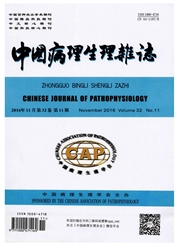

 中文摘要:
中文摘要:
目的:观察银杏内酯B对体外培养的大鼠视网膜神经细胞凋亡的影响及可能的作用机制。方法:采用体外原代培养的大鼠视网膜神经细胞,建立谷氨酸损伤的视网膜神经细胞凋亡模型,与不同浓度的银杏内酯B(ginkgolide B,GB)共同培养,用MTT法测定神经细胞存活率;流式细胞仪检测神经细胞凋亡及其相关基因Bcl-2和Bax蛋白表达。结果:谷氨酸(0.8mmol/L)作用后,视网膜神经细胞存活率降低。GB不同时间及不同剂量作用组与谷氨酸处理组比较,视网膜神经细胞内Bcl-2和Bax阳性蛋白表达及两者比值均有显著差异(P〈0.01),细胞凋亡明显减少。结论:GB能剂量依赖性对抗谷氨酸兴奋性毒性,保护视网膜神经细胞,这一作用可能是通过促进Bcl-2蛋白表达并减少Bax蛋白表达,上调Bcl-2/Bax比值而抑制视网膜神经细胞凋亡来实现的。
 英文摘要:
英文摘要:
AIM: To observe the effect of ginkgolide B (GB) on glutamate- induced apoptosis in the cultured neurom of rat retina. METHODS: Neurons of rat retina were cultured and apoptosis was induced by glutamate. The neurons were cultured with different concentration of GB and the survival rate was monitored by 3- (4, 5- dimethylthiazol - 2- yl) - 2, 5- diphenyltetrazolium bromide (MTT) assay. The apoptosis in the cultured neurons and the expression of Bcl- 2 and Bax were observed by flow cytometry. RESULTS: After exposed to glutamate, the survival rate and the number of Bcl-2 positive cells obviously decreased. At the same time, the number of Bax positive cells obviously increased, and the number of the apoptotic cells also obviously increased. Such phenomena were relieved by the treatment of ginkgolide B, with raise of survival rate and the expression of Bcl - 2. Meanwhile, the expression of Bax and the apoptosis of neurocytes obviously decreased. CONCLUSIONS: Ginkgolide B protects retinal neurons from the virulence induced by glutamate. Such effects of GB might be brought about by increasing the expression Bcl - 2 while decreasing Bax, resulting in increasing the ratio of Bcl - 2 to Bax and so reducing the apoptosis in the cultured neurons of rat retina.
 同期刊论文项目
同期刊论文项目
 同项目期刊论文
同项目期刊论文
 期刊信息
期刊信息
